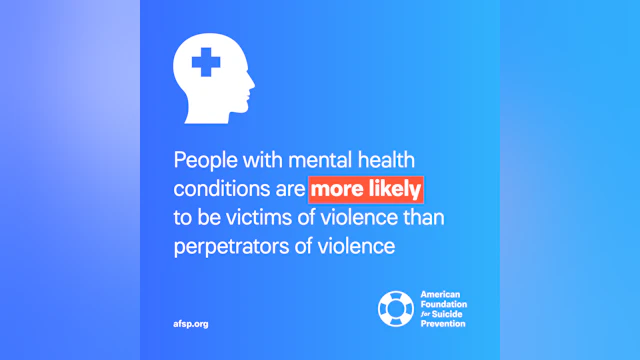March 7, 2018 - The recent tragic event in Parkland, Florida has opened up important conversations about violence in our nation. One topic that continues to come up is mental illness and the need for mental health resources. We hear it in media and we hear it in informal conversation.
Since the topic of mental health and mental illness has been raised, let’s be sure to clear up any misconceptions as we continue to fight for mental health and suicide prevention. While it is certainly true that we must work toward greater access and quality of mental health care in the U.S., it must be pointed out that the linkage between mass violence and mental illness is a red herring – misleading and grossly distorted.
During my recent travels around the country, I met people from different sectors – education, entertainment, tech, health, corporate – many of whom upon learning I am in the suicide prevention field, quickly offered comments like, “Wow, you must have been busy since the school shooting in Florida.”
What do they mean? These informal comments seem to represent a range of thoughts I’ve inquired about in an attempt to learn more about people’s commonly held assumptions. Some people assume that anyone who would commit an act of mass violence must be disturbed and therefore mentally ill; paired with this idea is the assumption that anyone with the intent of killing others must also be suicidal. Both of these notions are gravely untrue, conflating very distinct issues and behaviors.
Some people I spoke with were concerned that the ripple effect across the community and country has led to increased stress and upset, a state of being they presumed could destabilize many people’s mental health, and possibly increase the suicide risk for some. This assumption is much truer.
It is important that people come to know the facts, and end the mistaken, widespread belief that acts of violence are driven by mental illness. Studies have found that of all violent acts in the U.S., less than five percent of violence in the U.S. is attributable to mental illness. While people who commit violent acts certainly have a host of problems that lead them to become violent, in the vast majority of cases, a treatable mental illness is NOT the cause. It should also be noted that the category of mass violent acts includes domestic/family violence, which are a much more common form of violence than public mass shootings.
Data shows that people committing violent acts are much more accurately characterized by other factors, such as a prior history of aggression, including domestic violence, often with a criminal record including convictions of violent misdemeanor crimes; and of alcohol and drug related offenses. Impulse control problems, trauma, rage, childhood adversity, desperation, financial strain, vindictiveness, narcissism, sociopathy, and psychopathy are all potential risk factors for violence and major problems to address, but they are not the same as a mental health condition. To be clear, most people with depression, bipolar disorder, anxiety disorders, PTSD, schizophrenia, borderline personality disorder, eating disorders, substance use disorders, etc. do not exhibit violent behavior, particularly in the absence of the previously mentioned more potent risk factors.
In fact, people with mental health conditions are much more likely to be marginalized in our modern society in numerous ways. Lack of understanding, lack of access to quality mental health care, and lack of social support are major challenges we must overcome. Further, research shows that people with mental illness are more likely to be the victims of violence than people without mental illness, and are far more likely to be victims than perpetrators of violence.
Debunking the myth that links violence to mental illness is just one critical way we will make progress toward diminishing stigma, allowing more community members to have accurate perceptions and practice more compassionate approaches to people with mental illness.
References
Mental illness on its own does not generally lead to violence
Appelbaum PS. Violence and mental disorders: data and public policy. Am J Psychiatry. 2006;163(8):1319–1321.
Youth Violence: Risk and Protective Factors. CDC website. https://www.cdc.gov/violenceprevention/youthviolence/riskprotectivefactors.html. Accessed March 6, 2018.
Hirschtritt ME, Binder RL. A Reassessment of Blaming Mass Shootings on Mental Illness. JAMA Psychiatry. Published online February 28, 2018. doi:10.1001/jamapsychiatry.2018.0010
Elbogen EB, Johnson SC. The Intricate Link Between Violence and Mental Disorder: Results From the National Epidemiologic Survey on Alcohol and Related Conditions. Arch Gen Psychiatry. 2009;66(2):152–161. doi:10.1001/archgenpsychiatry.2008.537
Mental Health and Violence. Harvard Medical School website. https://www.health.harvard.edu/newsletter_article/mental-illness-and-violence. January 2011. Accessed March 6, 2018.
Treatment Advocacy Center https://www.treatmentadvocacycenter.org/evidence-and-research/learn-more-about/3633-risk-factors-for-violence-in-serious-mental-illness
Treatment Advocacy Center https://www.treatmentadvocacycenter.org/fixing-the-system/features-and-news/4190-dr-e-fuller-torrey-mental-illness-and-mass-murder
Victimization references
Maniglio R. Severe mental illness and criminal victimization: a systematic review. Acta Psychiatrica Scandinavica. 2009;119(3):180–191. doi:10.1111/j.1600-0447.2008.01300.x
Mentally ill 'at high risk of being victim of violence.' BBC News website. http://www.bbc.com/news/health-17182626. February 28, 2012. Accessed March 6, 2018.
At risk, yet dismissed: The criminal victimization of people with mental health problems. https://www.victimsupport.org.uk/sites/default/files/At%20risk%2C%20yet%20dismissed%20-%20summary.pdf. 2013. Accessed March 6, 2018.
Hughes K, Bellis MA, Jones L, et al. Prevalence and risk of violence against adults with disabilities: a systematic review and meta-analysis of observational studies. The Lancet. 2012;379(9826):1621–1629. doi: https://doi.org/10.1016/S0140-6736(11)61851-5
Other organizations’ policies/statements
MHA http://www.mentalhealthamerica.net/positions/violence
American Psychiatric Association blog http://alert.psychnews.org/2018/02/blaming-mass-shootings-on-serious.html
American Psychological Association blog http://www.apa.org/research/action/speaking-of-psychology/dispelling-myth.aspx
